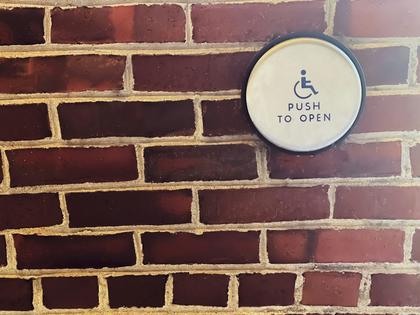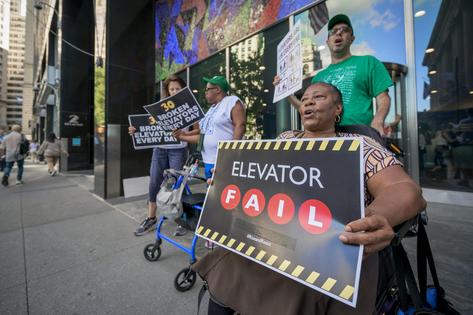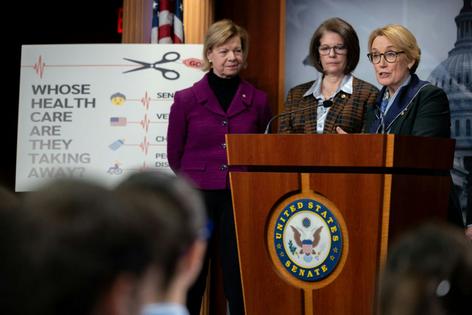Cutting Medicaid and federal programs are among 4 key Trump administration policy changes that could make life harder for disabled people
Published in Political News
While policy debates on immigration, abortion and other issues took center stage in the 2024 presidential election, the first months of the Trump administration have also signaled major changes in federal disability policy.
An estimated 20% to 25% of Americans have a disability of some kind, including physical, sensory, psychological and intellectual disabilities.
Disability experts, myself included, fear that the Trump administration is creating new barriers for disabled people to being hired at a job, getting a quality education and providing for basic needs, including health insurance.
Here are four key areas of disability policy to watch over the coming years.
The Americans with Disabilities Act, which became law in 1990, requires that employers with more than 15 employees not discriminate against otherwise qualified candidates on the basis of their disability. It also requires that employers provide reasonable accommodations to disabled workers. This means, for instance, that a new or renovated workplace should have accessible entrances so that a worker who uses a wheelchair can enter.
Despite these protections, I have spoken to many disabled workers in my research who are reluctant to ask for accommodations for fear that a supervisor might think that they were too demanding or not worth continuing to employ.
Trump’s actions in his first days in office have likely reinforced such fears.
In one of the many executive orders Trump signed on Jan. 20, 2025, he called for the relevant government agencies to terminate what he called “all discriminatory programs,” including all diversity, equity, inclusion and accessibility policies, programs and activities that Trump deems “immoral.”
The next day, Trump put workers in federal DEIA and accessibility positions on administrative leave.
The following week, a tragic plane crash outside Washington, D.C., killed 67 people. Trump, without any evidence, blamed the crash on unidentified disabled workers in the Federal Aviation Administration, enumerating a wide and seemingly unrelated list of disabilities that, in his mind, meant that workers lacked the “special talent” to work at the FAA.
Advocates quickly pushed back, pointing out that disabled workers meet all qualifications for federal and private sector jobs they are hired to perform.
Many government disability programs have complex rules designed to limit the number of people who qualify for support.
For instance, I study supplemental security income, a federal program that provides very modest cash support – on average, totaling US$697 a month in 2024 – to 7.4 million people who are disabled, blind or over 65 if they also have very low income and assets.
It can take months or even years for someone to go through the process to initially document their disability and finances and show they qualify for SSI. Once approved, many beneficiaries want to make sure they don’t accidentally put their benefits at risk in situations where they are working very limited hours, for example.
To get answers, they can go to a Social Security office or call an agency phone line. But there are already not enough agency workers to process applications or answer questions quickly. I spoke in 2022 with more than 10 SSI beneficiaries who waited on hold for hours while they tried to get more information about their cases, only to receive unclear or conflicting information.
Such situations may grow even more severe, as Trump and billionaire Elon Musk try to eliminate large numbers of federal employee positions. So far, tens of thousands of federal workers have been laid off from their jobs in 2025. More layoffs may be coming – on Feb. 12, 2025, Trump instructed federal agency heads to prepare for further “large-scale reductions in force.”
At the same time, multiple Social Security Administration offices have also been marked for closure since January 2025. An overall effect of these changes will be fewer workers to answer questions from disabled citizens.
Students with disabilities, like all students, are legally entitled to a free public education. This right is guaranteed under the Individuals with Disabilities Education Act, passed in 1975. IDEA is enforced by the federal Education Department.
But Trump is reportedly in the process of dismantling the Education Department, with the goal of eventually closing it. It is not clear what this will mean for Individuals with Disabilities in Education Act enforcement, but one possibility is laid out in the Project 2025 Mandate for Leadership, a policy blueprint with broad support in Trump’s administration.
Project 2025 proposes that Individuals with Disabilities in Education Act funds “should be converted into a no-strings formula block grant.” Block grants are a funding structure by which federal funds are reduced and each state is given a lump sum rather than designating the programs the funds will support. In practice, this can mean that states divert the money to other programs or policy areas, which can create opportunities for funds to be misused.
With block grants, local school districts would be subject to less federal oversight meant to ensure that they provide every student with an adequate education. Families who already must fight to ensure that their children receive the schooling they deserve will be put on weaker footing if the federal government signals that states can redirect the money as they wish.
Before President Barack Obama signed the Affordable Care Act into law in 2010, many disabled people lived with the knowledge that an insurer could regard a disability as a preexisting condition and thereby deny them coverage or charge more for their insurance.
The ACA prohibited insurance companies from charging more or denying coverage based on preexisting conditions.
Republicans have long opposed the ACA, with House Speaker Mike Johnson promising before the 2024 election to pursue an agenda of “No Obamacare.”
About 15 million disabled people have health insurance through Medicaid, a federal health insurance program that covers more than 74 million low-income people. But large Medicaid cuts are also on the Republican agenda.
These deep cuts might include turning Medicaid into another block grant. They could also partly take the form of imposing work requirements for Medicaid beneficiaries, which could serve as grounds on which to disqualify people from receiving benefits.
While proponents of work requirements often claim that disabled people will be exempt, research shows that many will still lose health coverage, and that Medicaid coverage itself often supports people who are working.
Medicaid is also a crucial source of funding for home- and community-based services, including personal attendants who help many people perform daily activities and live on their own. This helps disabled people live independently in their communities, rather than in institutional settings. Notably, Project 2025 points to so-called “nonmedical” services covered under Medicaid as part of the program’s “burden” on states.
When home- and community-based services are unavailable, some disabled people have no options but to move into nursing homes. One recent analysis found that nursing homes housed roughly 210,000 long-term residents under age 65 with disabilities. Many nursing facilities are understaffed, which contributed to the brutal toll of the COVID-19 pandemic in nursing homes.
In response to both the pandemic and years of advocacy, the Biden administration mandated higher staffing ratios at nursing homes receiving Medicare and Medicaid reimbursement. But Republicans are eyeing repealing that rule, according to Politico’s reporting.
Tracking potential changes to disability policy is a complicated endeavor. There is no federal department of disability policy, for example.
Instead, relevant laws and programs are spread throughout what we often think of as separate policy areas. So while disability policy includes obvious areas such as the Americans with Disabilities Act, it is also vitally relevant in areas such as immigration and emergency response.
These issues of health care, education and more could impact millions of lives, but they are far from the only ones where Trump administration changes threaten to harm disabled people.
Different programs have their own definitions of disability, which people seeking assistance must work to keep track of.
This was a daunting task in 2024. Now it may become even more difficult.
This article is republished from The Conversation, a nonprofit, independent news organization bringing you facts and trustworthy analysis to help you make sense of our complex world. It was written by: Matthew Borus, Binghamton University, State University of New York
Read more:
Why including people with disabilities in the workforce and higher education benefits everyone
Trump’s claims of vast presidential powers run up against Article 2 of the Constitution and exceed previous presidents’ power grabs
Parents with disabilities have faced discrimination for years in the US, but new rules will help ensure that child welfare systems treat them more fairly
Matthew Borus received funding in the past from ARDRAW, a small grant program for graduate students working on disability research. The program was run by Policy Research, Inc. and funded by the Social Security Administration. The opinions and conclusions expressed here are solely the author's.




























































Comments